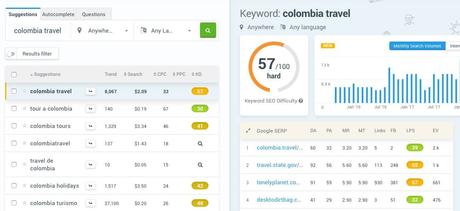Marketing a travel brand or blog is a lot like marketing any online business. The difference is in the message - how do you want your clients or readers to perceive your business and what value are you offering to them.
Search Engine Optimization, also known as SEO, is a skill that, once learned, can mean the difference between content that languishes at the bottom of the search results and content that brings thousands of visits to your site. To do proper SEO for travel websites, a plan is essential. And you need people that can execute on the plan. The travel niche is competitive - isn't everyone a traveller blogger these days?
Crafting Content and Website Copy
Looking at the trending articles on social media, one might think that short, listicle-type, controversial articles are the way to go. But does that suit your blog personality? Maybe not. In that case, avoid listicles. Try to be unique. Your blog will stand out in the long term and Google will reward your site with organic traffic for years to come. Ask yourself if you want to be a mini-Buzzfeed for travel or a site that people trust?
Content writing for travel blogs and services should focus on providing answers and value.
One way to find out what your audience needs is to survey your clients (or readers) and try to elicit questions. The more problems they can tell you about, the better. Make a list of every single question, problem, and pain point.
Turn their questions and doubts into answers. Make your customers a source of content.
Businesses that offer package tours, for example, should write detailed descriptions of their products, right down to the exact locations visited, the food clients might try, and the experiences they can have. Make the boring tour guide brochure into an ultimate location guide to the location - a great lead generation trick.
Hire writers that produce high-quality content. It's one of the best investments you can make. Good writing always wins. Low-quality, thin, copied content signals Google that your website and brand is not a quality product worthy of front page results in search.
Use copywriters (or trusted content writers) to create compelling headlines, calls-to-action, sales pages, and emails. Skilled copywriters can grab people's attention without making the message sound spammy.
Don't forget to create click-worthy meta description tags. This is often overlooked. Content Management Systems (CMS) such as WordPress automatically pull text from your content to use as a description but you should create your own. Short, snappy, attention-grabbing descriptions should draw a potential reader in. Google ignores Meta tags in the search algorithm but this text appears in the search engine results pages. Make sure it tells potential readers exactly what your post is about and what value you hope to deliver to them.
In August 2018, a major Google update caused a drop in rankings and traffic for some major websites in the health niche. Many of these sites are household names. Nobody knows for sure why their websites received penalties but there's a good possibility that Google considers the content quality to be low.
The travel niche differs from the health niche but the same principles should apply:
- Write about what you know or are qualified to write about. If 'writing' is not your thing, hire someone with credentials and amazing research skills to help.
- Don't make claims you can't back up.
- If you quote statistics or facts, make sure you've done your research and that claims are true. "Fake news" will get your website penalised.
Build Relationships With Bloggers
Connect with influencers. Use an influencer marketplace (we know a few) or manually reach out to people in your niche. Building relationships through conversation is still the best way to progress.
Keyword Research for Travel Niches
Perform in-depth keyword research to find out what your potential customers are looking for. Understand where you can outperform your competitors. If you're just starting off, looking for long tail keywords to help your website to rank in Google.
High-competition keywords like "Travel Japan" are well out of reach of startups, beginner bloggers, and boutique travel agencies. Try to find less competitive keywords like "Bangkok travel for over 40s". (Try to make this relevant to your niche). You won't get as many clicks but some clicks are better than none when you're building your business.
How to do Keyword Research for Travel
This is a huge topic. There's a lot of traffic at stake and a lot of money to up for grabs to those that get it right.
Many SEOs still recommend Google Keyword Planner for research. Don't go there. I get pitched guest blog posts by agencies and bloggers all the time. They give me a keyword followed by the monthly searches and the competition level. Competition is a number that reflects how difficult it is to rank for a certain keyword. Google Keyword planner suggests a number. But this is for Google Ad competition and has nothing to do with how difficult it is to rank in search. The search volume is always incorrect too because Keyword Planner does not offer exact volumes, only ranges.
I think you'll agree that a range of 100-1000 is pretty wide. One blogger assured me that their target phrase had 1000 searches a month. The actual volume was more like 100. Quite a difference.
A tool like KWFinder is more accurate.

KWfinder lets you find low competition keywords that people are searching for. It also shows the top ten results based on any location in the world. When you search for anything in your browser the results you see are determined on your previous search history, your location, and a few other things. Keyword tools strip this personalised result data out and present the 'real' results.
It's not perfect but it's a great way to start. I use it with Ahrefs and a handful of other tools. I also use excel spreadsheets with my own ratios. And I do manual checks and reviews of content. You can go pretty deep here but the better you understand what Google, and readers, want to see, the better content you can produce.
Keep in mind that SEO tools use algorithms and best-guess methods for finding keyword competition. So they're not perfect. Don't take the results as the definitive answer (there is no final/gospel/authority word on keywords). But there are other ways to find juicy content phrases.
Use Google's related searches to find out what people are actually searching for around a topic.
After searching for a topic, scroll to the bottom of the page and look for "Searches related to..."
These search terms might spark your imagination and give you ideas for blog content.
A Chrome plugin called Keywords Everywhere is great for getting enable search volumes and pay-per-click cost estimates beside the related terms. This is great for getting a quick idea of the competition and the search volumes.
Quora and Reddit
Use Quora and Reddit to find topics that people are asking about.
If you find a relevant question in the travel niches, check to see how many times it has been answered and the number of views for each answer.
Reddit can be a bit of a minefield of etiquette and crazy behaviour, but it's a great source of ideas. People ask and discuss questions on Reddit in specific sub-niche sections called subreddits. To get ideas, read the questions and answers or search for specific topics. You can even ask questions that might help you with a blog post.
Test Variations Of Headlines and Keywords
Run "split tests" on your most important page
Split tests, also called A/B tests are part of what marketer's call Conversion Rate Optimisation (CRO). CRO for travel businesses isn't any different than with tech or health, for example.
You perform A/B tests by creating a special version of a web page or section of a web page and changing something on the new version. It could be the entire text of the page or a design change. It could even be something as simple as the colour of a button or one word on the page.
A simple change in button colour can have a big impact on your conversion rate.
Maybe readers don't notice the call to action because the background colour of the button isn't striking enough.
Knowing which version of the page performs better is the beauty of split testing. By sending some visitors to your original page and other visitors (usually 50% of the total ) to the page with 'changes', you can compare the conversion results. Make the best-converting page be the permanent one.
Google Optimize is a free tool that will get you started with optimization tests. It takes a bit of learning, but it's worth the effort.
Another way to do this is to run Facebook Ads with different headlines for the same article link. After a while, you'll see which headline grabs the most attention. You can then use this as the SEO title of your blog post.
Mobile-First
Make sure your website looks great on a mobile phone. But don't obsess over mobile conversion. Many people still browse and evaluate services and products on mobile phones but make their purchases on desktop computers. Tracking user journeys across devices is a tricky thing to do but Google (and other tech firms) is getting better at helping us through it.
If your mobile website offers a bad user experience, don't expect your business to shine in the search results. The site should look good but it should also be easy to navigate, buttons must be easy to press (with thick thumbs), and pages should download fast.
Test your mobile speed and performance here.
Final Words
Every travel industry website has to compete with millions of travel blogs on the internet. There's a lot of content out there to compete with for keywords. SEO-savvy travel bloggers, agencies, and services have the advantage that they can laser-target specific keywords that their potential clients are searching for.
As people wake up to the fact that travel blogs can be lucrative, the competition gets stronger. But you can stay ahead of the game by doing what most people don't, creating a marketing plan. Treat your blog like a business.


